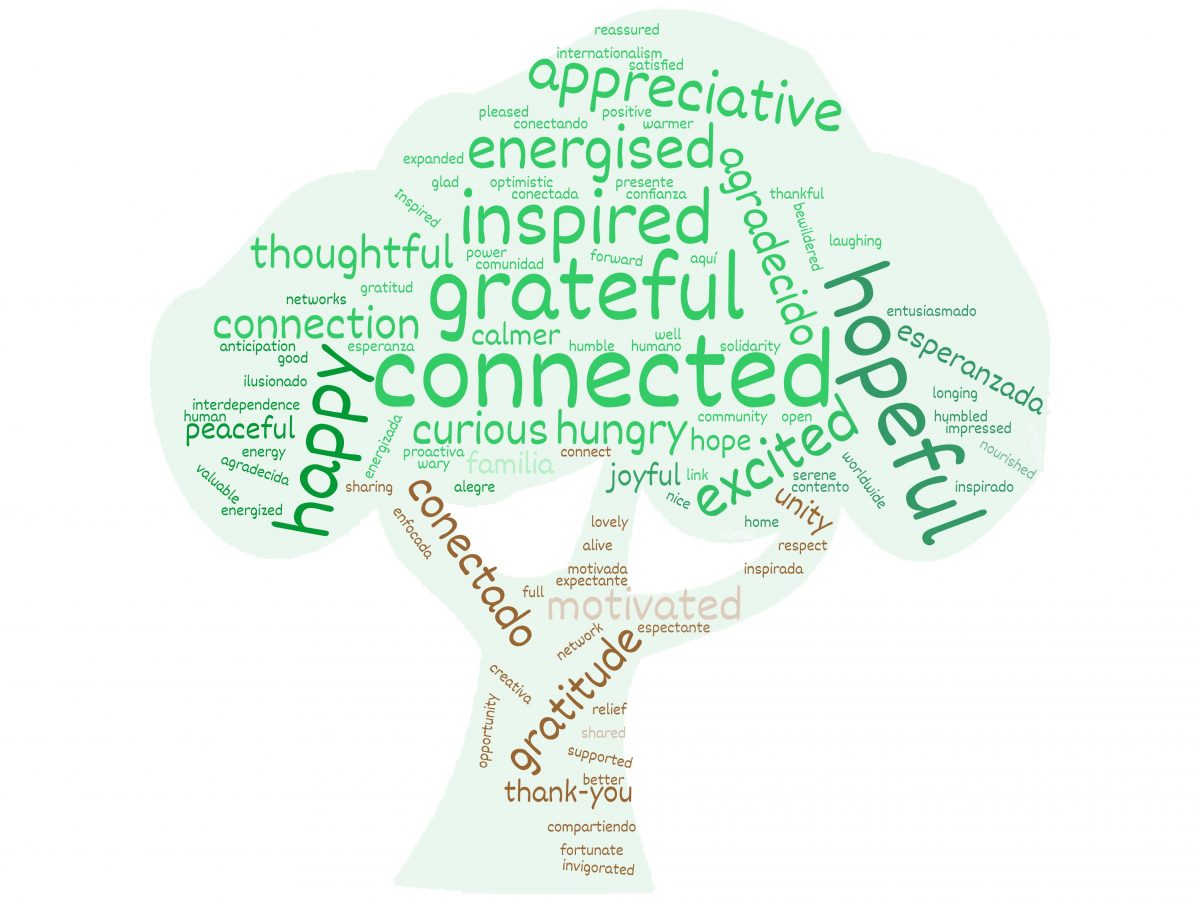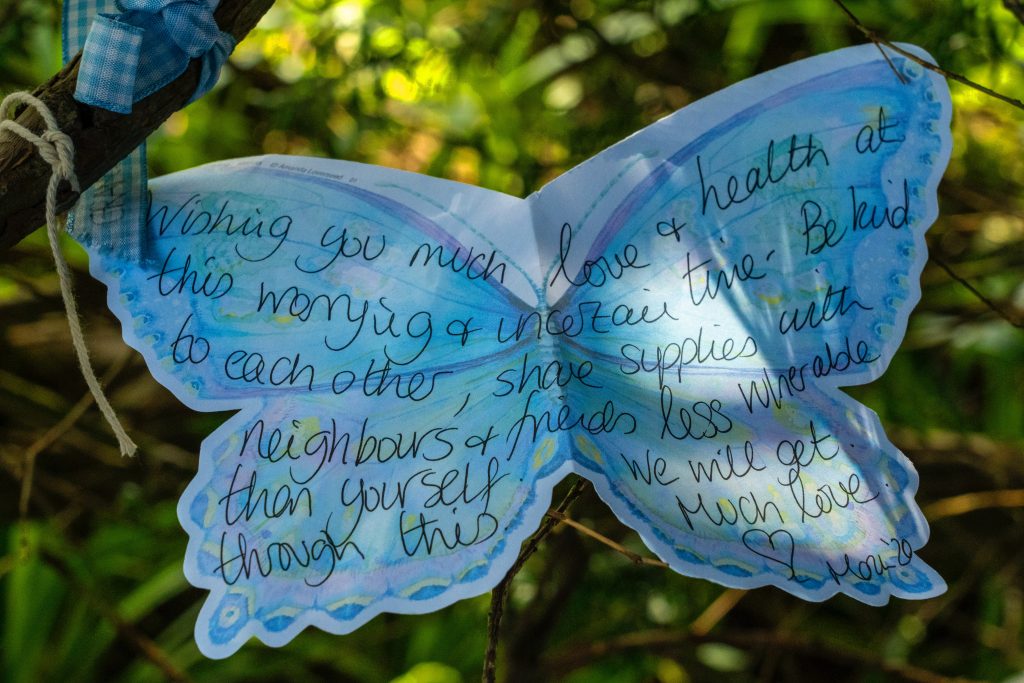Pause, listen, reflect, adjust – how Transition Network is responding to the global pandemic
By Sarah McAdam 7th May 2020
We’re not all in the same boat, but we are experiencing the same storm.
This piece has been written collaboratively by people in the Transition Network team to tell the story of how our organisation has responded, so far, to the COVID-19 pandemic and to let you know what we’re planning to do next. We thought it would be helpful to provide a bit of context for the reflections, stories and resources we will be sharing over the coming weeks.
But before you read on, we invite you to take a moment to breathe and notice how much time has passed since a new virus called COVID-19 first came to your attention. Maybe reflect on the ways your life has altered since then and the ways it has stayed the same. Has the pandemic changed what you are expecting and imagining as you look to the future? Are you getting the time and space you need to feel the impact of what’s happening to you and around you and to find your own response?
The Transition Network team is based in Belgium, Portugal and the UK. Most of us work from home and we spend a lot of our time online, collaborating with people across the world. As the pandemic spread and restrictions began to be imposed, our team met online for one of our regular staff meetings and agreed to use the time to speak in a deeply personal way about what we were experiencing and how we were feeling. This is an important part of our practice of change – taking time to share a little of our vulnerability and individual circumstances helps us build strong collaborative relationships rooted in trust and supports us to take care of ourselves and each other. We do our best to pause and share something personal in even the busiest, most stressful moments and we find that our work flows more smoothly when we do this.
As well as getting some relief, comfort and connection from expressing our feelings and talking about our lives beyond Transition Network, we often learn things that help us better align our work with what’s needed. Our conversation about COVID-19 helped us understand that, even within our not particularly diverse team, we were experiencing very different impacts. Our capacity to respond positively to the fast-changing situation was hugely dependent on who we were able to connect with, whether we had access to outside space and to nature, whether we were engaging in 24 hour child care, how stressful it was for us to get food etc. Not a stunning revelation, but it helped us really understand that when we started to communicate about the pandemic, we needed to encourage people to speak from personal experience and avoid assumptions that would alienate and exclude. Despite the frequent references to us all being in the same boat, geography, power and privilege have a huge influence on our ability to weather this current storm with our health and livelihoods intact.

That same team conversation also gave us direct evidence that people could have very different emotional responses to similar circumstances. Some of us were feeling excitement and a desire to respond to the new needs and opportunities arising as a result of the pandemic and were eager to start exploring this. Others felt overwhelmed and couldn’t stay engaged if the conversation moved to practical next steps. As the days went on, our emotions kept changing – we noticed that many of us were cycling through the stages of grief, experiencing shock, denial, anger, depression, bargaining and acceptance at various points during our days and weeks. We felt a need to take things gently and slowly, remembering this as we engaged with people outside our own team.
Another important element of Transition Network’s practice of change is to collect and listen to feedback and reflect about what we’re hearing – again, resisting the temptation to move too speedily to action. Of course, there’s a balance here – a crisis will often require quick responses – but we try to avoid running away with ourselves. Focusing on the next step, rather than making complicated far-reaching plans and building in pauses so we can listen, reflect and adjust what we’re doing to the fast-changing environment in which we’re working.
In this case, feedback from various sources helped us decide that a space was needed for those connected to the Transition movement globally to come together to have their own version of our team conversation. Working with the Transition Hubs Group, we organised online meetings at which around 140 people from 28 countries shared their experiences of the pandemic and told stories about how they, and their communities, were responding. Many Transition Hubs have organised similar calls in their territories and it’s been clear how much people value being able to connect with others and make meaning together of what’s happening. There is something particularly powerful about connecting internationally at a time when our physical lives have become so much more confined. We are discussing with the Hubs Group how we can offer more structured opportunities for this over the next few months.

Transition Network has initiated and been invited into numerous conversations with other organisations and networks about how we can learn from, and respond positively to, the global pandemic. Here’s a blog by Rob Hopkins which explores this question in a little more detail, harvesting and sharing stories of how Transition groups and Hubs across the world are demonstrating resilience and creativity in the face of this new challenge.
Here are a couple of insights that have come up as we have reflected together and with others:
We’re seeing the power of finding and exploring good questions in a time of significant change rather than moving directly to answers.
Here are two questions that are helping us engage in helpful dialogues with people who may not have the same starting point or end goal as us:
- Who and what has supported us in this crisis and how can we strengthen those people, communities and capacities during the recovery?
- What possibilities open up and threats can be averted when we focus on wellbeing, equity and resilience, rather than growth?
We have seen the value of innovative forms of governance that help us adapt flexibly to fast-changing circumstances.
Our team made a shift to a non-hierarchical, distributed governance in April 2018 and the Transition Hubs Group is experimenting with similar approaches. Clarity about roles and decision-making meant that all members of the team felt empowered to explore the changing context and adjust their plans and activities accordingly. We don’t have to go through a complex and time-consuming process to review a rigid long-range strategy. Instead, our primary circle of trustees and staff met in April to agree a simple change to the areas on which Transition Network will focus its attention and resources during 2020 (we’ll provide more detail on this in a forthcoming blog).
What next?
Transition Network has already been promoting stories of community resilience and solidarity in response to the pandemic and we’ll be doing lots more of this in the weeks and months to come. We want to celebrate and amplify our capacity as humans to respond to crisis with altruism, creativity and dedication. We’re particularly interested in demonstrating that local communities and enterprises are able quickly to design and implement solutions that are responsive to their own needs and circumstances and that a crucial role for governments is to provide resources and support to enable this to happen.
We know that Transition Network has many tools and resources that would be helpful to new groups that are being established at the moment and to existing groups that are adjusting to the new situation. We will find new ways to highlight what is already on offer and, where we have identified useful materials that are incomplete or need to be tweaked, we will prioritise getting those to you as soon as possible. We are also supporting the revitalisation of training as we know that access to training helps groups sustain, re-energise and focus themselves and their work. A new Training Circle is working on this and have invited input from the movement.
We’re pleased to announce that we’re working with others from the Transition Hubs Group to support a hugely innovative online Transformative Conflict programme – there can often be an initial burst of energy and enthusiasm when people come together to respond to a crisis, but times of stress can also resulting in damaging and exhausting group dynamics. If your group is going to sustain itself, change and grow and create spaces where a rich diversity of people can collaborate effectively, then learning how to respond well to conflict is a must!
Keep an eye on our Facebook and Twitter accounts for more information about the Transformative Conflict programme – as well as daily articles, resources and reflections from across the Transition movement and beyond. We really welcome feedback on what we produce – our small organisation won’t be able to respond to all the needs and opportunities that are arising right now, but you can help us understand what’s possible and make good choices about where we concentrate our time and energy.
It seems that COVID-19 and its impacts will be with us for some time and we know many communities will be responding with ingenuity, compassion and determination. We encourage you to pause at key moments along the rollercoaster to reflect, notice how you and your group are doing and take positive steps to take care of yourselves and others.
And finally, one key way we sustain, celebrate and inspire ourselves on this journey is by telling stories of resilience and solidarity. Whether it’s Covid-19 related or not, you can find out how to share your story with us here.
